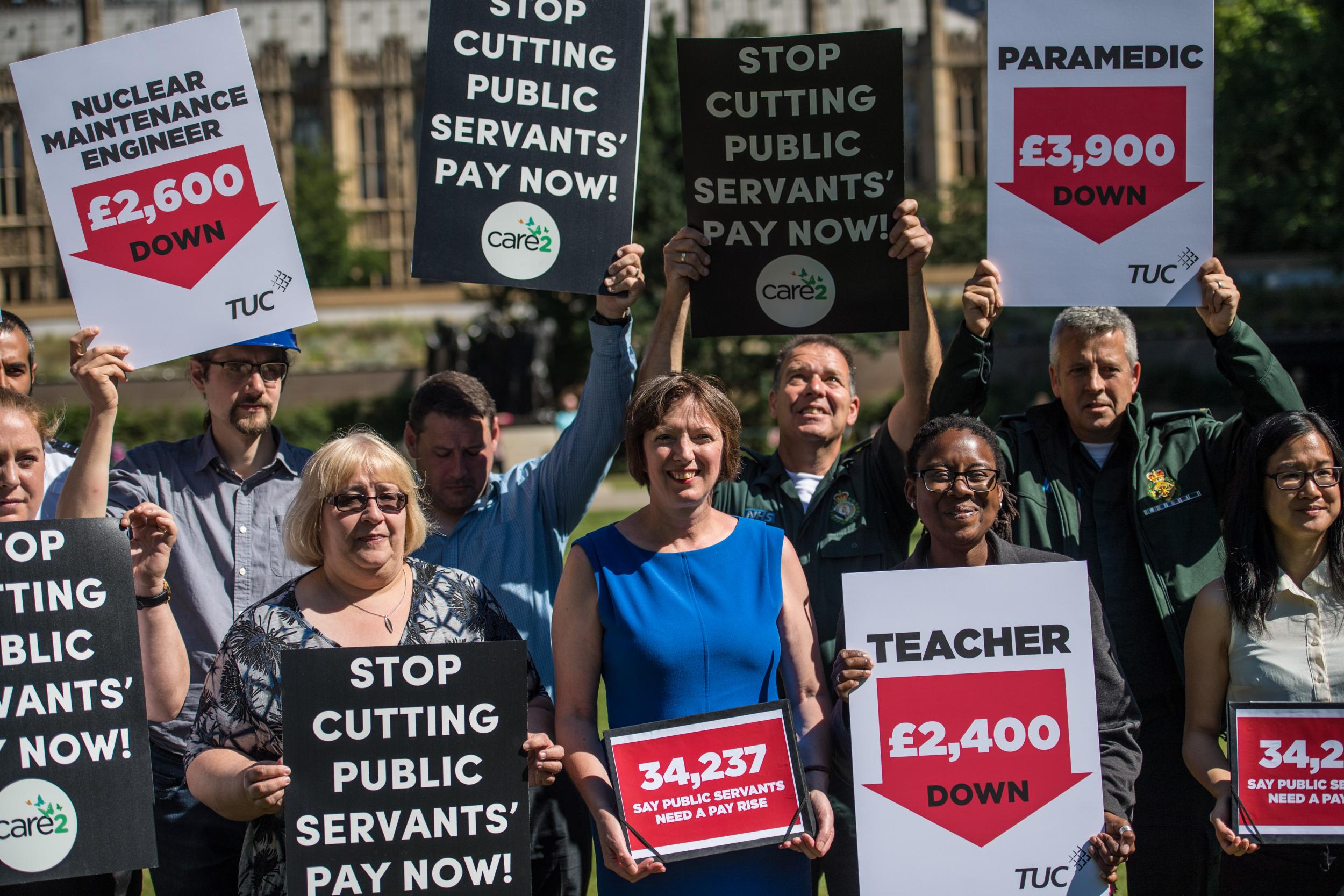Surge in public sector workers relying on charity handouts to make ends meet
Exclusive: Police officers, nurses and teachers receiving charitable grants at higher rate than ever amid stagnating wages and rise in living costs, figures show

Your support helps us to tell the story
From reproductive rights to climate change to Big Tech, The Independent is on the ground when the story is developing. Whether it's investigating the financials of Elon Musk's pro-Trump PAC or producing our latest documentary, 'The A Word', which shines a light on the American women fighting for reproductive rights, we know how important it is to parse out the facts from the messaging.
At such a critical moment in US history, we need reporters on the ground. Your donation allows us to keep sending journalists to speak to both sides of the story.
The Independent is trusted by Americans across the entire political spectrum. And unlike many other quality news outlets, we choose not to lock Americans out of our reporting and analysis with paywalls. We believe quality journalism should be available to everyone, paid for by those who can afford it.
Your support makes all the difference.The number of public sector workers relying on charity handouts to make ends meet has soared since 2010 as stagnating wages fail to match the rise in living costs, The Independent can reveal.
New figures show police officers, nurses and teachers are receiving charitable grants at a higher rate than ever because they are struggling to pay rent and provide for their children.
Labour described the figures as “utterly shameful”, while the Liberal Democrats said it was “appalling” that public sector staff are “begging for money”.
One community police officer said he and his family were left with “nothing” at the end of each month even though he and his partner both worked in full-time public sector jobs. He said that he can’t afford to do basic activities with his children, such as taking them swimming, despite careful budgeting.
It comes after years of wage freezes and pay rises below inflation for public sector workers: nurses’ pay has dropped by 14 per cent in real terms, while teachers’ wages in England were worth 12 per cent less in 2015 than they were in 2005.
Police constables’ average basic pay has also been reduced by approximately 12 per cent in real terms since 2010 as a result of changes to pay coupled with inflation rates.
New figures from Britain’s largest grant-giving charity show the number of public sector workers receiving grants is up by more than 100 per cent in seven years, compared to a 10 per cent increase in the overall number of grants given.
Turn2us, which helps people in financial hardship to access charitable grants and support services, said that of the 3,278 grants it gave out last year, more than half (50.8 per cent) went to people working in education, health and government or local government, compared to just 24.6 per cent in 2010.
A quarter of grants went to people working in health and social care, with 900 people in the sector receiving grants from the charity last year, compared with 413 in 2010. More than half of these (56 per cent) went to nurses.
The number of people working in education receiving charity funds increased from 364 to 802, with the vast majority of these (76 per cent) being given to fully qualified teachers.
The public sector jobs that saw the largest increase were those in government and local government, a group made up predominantly of police officers, for whom the number of grants received grew by 320 per cent, from 30 to 126.
Justin Winn, a police community support officer (PCSO) who lives in Suffolk with his partner and two children, aged five and 18, said the family was left with “nothing” at the end of each month.
The 42-year-old said the pay freeze, coupled with changes to his shift patterns in recent years that meant he no longer received shift allowances and weekend enhancements, had left him thousands of pounds poorer each year.

“I work full-time and have been doing it for 11 years and try to do a good job. But changes to shift allowances have left me around £5,000 a year worse off, and that’s on top of the pay freeze. There’s nothing left at the end of the month,” he told The Independent.
“We don’t go on holiday every year; we don’t get new cars every few years. We can’t afford it. But it’s the little things, like not being able to afford to take the children swimming at the weekend. We have to decide do we want to have decent home-cooked meals this week or take the children out at the weekend.”
Mr Winn said the stress caused by the financial struggle coupled with the nature of the job meant he was “looking in the paper every week to see what other jobs are out there”, adding: “The stress in the job, you never know what’s round the corner.
“You think you could be getting paid more money somewhere else for not as much work and not as much danger. I see people leaving monthly. They can’t handle the stress and the amount of money we’re losing.”
The figures come after an analysis revealed the number of children of public sector workers who are living in poverty surged by 40 per cent in the same period, with one in seven children whose parents work in jobs such as teaching and nursing now living below the breadline.
The research by the Trade Union Congress (TUC) showed that since 2010, an extra 150,000 children have been pushed into poverty, with families where both parents work in the public sector hit hardest by the Government’s pay restrictions and benefit changes.
Responding to the new figures, Debbie Abrahams, the Shadow Work and Pensions Secretary, said: “Public servants shouldn’t have to worry about making ends meet. That so many workers and their families are struggling is utterly shameful, and a direct result of this Government’s cuts to social security support and their complete failure to tackle the rising cost of living.”
Stephen Lloyd, the Liberal Democrat’s work and pensions spokesperson, said it was “appalling” that we are having to rely on charitable handouts to keep the country running, adding: “Our teachers, our police, our nurses all deserve better. We must not leave them begging for money.”
On the rise in police officers relying on charity handouts, Ché Donald, vice chair of the Police Federation of England and Wales, said it was “sad” but “not surprising”.
“Year after year the Government has chosen to give police officers a pay increase way below the rate of inflation putting them under greater financial pressure,“ he said.
“I know of cases where officers have been forced to use food banks, while others are turning to pay-day lenders incurring spiralling debts, just to be able to survive.”
Janet Davies, chief executive and general secretary of the Royal College of Nursing, said the “appalling” figures were another reminder why nurses need a “meaningful” pay rise this year.
“Nursing staff work hard to keep services going despite staffing shortages, increasing demand and funding cuts. Years of real-term pay cuts have left them struggling to make ends meet and, sadly, too many are choosing to walk away from nursing,” she said.
A Treasury spokesperson said: “The pay cap helped to protect public sector jobs as we continue to reduce the UK’s deficit, but we have confirmed that the across-the-board 1 per cent cap will no longer apply.
“We have acted to help people with their living costs, including cutting taxes and introducing the national living wage. The independent pay review bodies are now examining each workforces’ needs and will report in spring 2018.”
Join our commenting forum
Join thought-provoking conversations, follow other Independent readers and see their replies
Comments